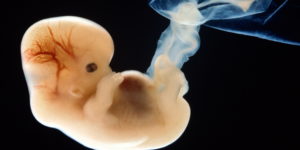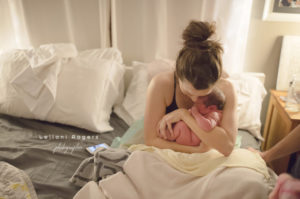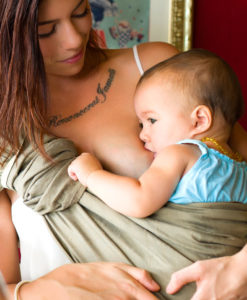Prenatal Education 9 Months to Save the World : Education begins before birth
Author: Global Prenatal Initiative

Precious moments spent in the womb represent the foundations for long-term health, emotional security, brain construction, creativity and even behavioral characteristics for every human being.
During pregnancy, it goes hand in hand with what a mother is experiencing and after delivery. We can hardly turn the clock back. Today, it is largely proved by scientific studies that it no longer has to do with any faith-based theses.
Discovering that mother’s emotions can directly influence a baby’s development in the womb is a turning point in the adoption of a new paradigm : the archaic vision of pregnancy in which the baby was just « a thing » unable to have his own feelings, is clearly behind us.
Such a vision is fully refuted by Dr. Barbara Findeisen, a psychotherapist with over 28 years of experience, in her book Womb Prints : « The psychology of the womb and birth is such a neglected subject ». She has been closely working with Dr. Burce Lipton, Ph.D., who is internationally recognized as a pioneer in New Biology. He is the main author of The Biology of Belief. He received the 2009 prestigious « Goi Peace Award » (Japan) in honour of his scientific contribution to global peace by freeing humanity from the fatalistic dogma of genetic determinism, bringing knowledge that is empowering us on the path of our self-determination. In Nature, Nurture and the Power of Love, his research has led to the fact that environmental signals are responsible for selecting the genes produced by the fœtus. Our DNA is no longer seen as rigid, but as flexible and constantly modified by nurture and how we perceive it, by giving shape to our body and our psychological attitude. Given that our perception has the final say as regards physical ressources, it is no doubt our responsibility to choose our filters of reality to regenerate ourselves so that we have a direct impact on our « genetic data base ». Thus, our fate is no longer determined by our genetic heritage and if we keep this as a postulate, to get to the bottom of things, it leads us to the concept of Maternal Empowerment : Mothers are able to build a better world !
I. What does it mean?

Scientific studies show a fetus receives chemical signals from its mother that could have a negative impact on how a baby develops after birth.
The psychological state of a mother has a direct impact on the health of a baby after birth.
Therefore would it not be wise to start feeling at peace with oneself before deciding to have a baby? It can become a way of life, a way of being. Moreover it would be easier to keep experiencing peace during pregnancy. Simple things should be done during pregnancy to stimulate your own secretion of hormones such as endorphins (well-being hormones) and oxytocin (the love hormone). For example, talking to your baby while in a state free of stress, would permit the releasing of these two chemical signals which are shared with the fetus through the umbilical cord. On the one hand, it is believed that these two hormones are crucial for development of the fetus, but on the other hand, stress hormones may play a terrific role. One of the hormones our brain releases when we are under the influence of stress is adrenaline. It can be highly useful in an emergency situation in which our survival instinct is needed but in everyday life it may be responsable for the increase of blood sugar levels, artery pressure, breathing rate, blood flow to skeletal muscles and heart rate. Moreover these hormones are addictive and both the body and mind become used to secreting one group more than the other. Our whole vision of life might be determined by this habit our mother gives us while in her womb. If a universal rule could then be found, it would sound like « the more you stay positive, the more you will prepare your baby to be so as well ! »
II. Who are the players in the field?

Global Prenatal Initiative
The GPI, known as the Global Prenatal Initiative, is a citizens organisation from the UK which has decided to gather and share scientific knowledge on prenatal issues and which has organized events all around the world. Its main aims are simple :
• To raise awareness in all sectors of society on the long-term impact of the 9 months of pregnancy thereby attaining individual and global peace, sustainable development and poverty eradication.
• To emphasize the impact of parenting, and especially the key role of the mother during pregnancy and birth, for the future of humanity.
• To advocate putting Prenatal Education at the heart of all education, health, social development and policy making. This is about to be done in the UK through the legislative validation process of the 1001 critical days Manifesto and in China where senior authorities are searching for new programmes to better anticipate pregnancy.
III. What are the alternatives ?
1. Home birth
 Seen as a good alternative The Royal College of Midwives (RCM) in the UK, support home birth for women who have uncomplicated pregnancies.
Seen as a good alternative The Royal College of Midwives (RCM) in the UK, support home birth for women who have uncomplicated pregnancies.
Women may choose home birth because they prefer the intimacy of a home and family or desire to avoid an over-medically centered experience, which hospitals offer. There is no reason why home birth should not be offered to women at low risk of complications and it may confer considerable benefits for them and their families. It is common sense in Northern European Countries such as the Netherlands, where the rate of home birth is one of the highest in the Western World. Some 30 percent of Dutch women deliver at home while around 60 percent do so in hospital, mostly for medical reasons, and another 10 percent deliver in special out-patient birthing clinics. In other European countries such as Germany, France, Britain, Belgium and the Scandinavian countries home deliveries account for no more than two percent. Thanks to the empowerment of midwives and doulas, it is far from being difficult to give birth at home, compared to France, where midwives have no insurance if anything should happen during labour. Should something go wrong during labour, a midwife in France would find him or herself solely responsable and would face a prison term or pay a considerable sum of money. Thus a pregnant woman is left with one option : deliver her baby at hospital in the emergency service, where she would be « warmly welcomed ». Can you imagine the beautiful cocktail of stress hormones and then pain ? However, in those countries in which midwives are appreciated for their wonderful work, families enjoy follow-up from the beginning, even before birth, up to delivery, and midwives or doulas work with the woman to win her trust in order that she should feel comfortable and safe on d-day, thanks to exercices aimed at warding off stress and suffering. Training in hypo-birthing, sophrology or yoga is highly useful to control your body pain and give birth in a natural way without epidural anesthesia.
There are other options for your pregnancy : Birth centers are good alternatives to hospitals as you are able to stay there, with your relatives, from one to nine months. These are places in which staff cares about you and your family by offering you the best conditions through workshops, training and artistic activities.
2. Breastfeeding
 A crucial thing on a mother to-do-list is definitely to breastfeed her baby.
A crucial thing on a mother to-do-list is definitely to breastfeed her baby.
In 2012, UNICEF announced that the increasing of breastfeeding rates in the UK could save the NHS money through improving health outcomes.
Thanks to the Infant Feeding Survey, done every five years and published by the NHS Information Centre, figures show that there were real improvements from 2005 to 2010. The proportion of breastfedbabies at birth rose by 5%, from 76% to 81%. The initial breastfeeding rate in 2010 was the highest in England at 83%, compared with Scotland, Wales, and Northern Ireland. Breastfed-babies are less likely to be subject to gastroenteritis, respiratory infections, sudden infant death syndrome, obesity, type 1 and 2 diabetes and allergies such as asthma or lactose intolerance. Its entire immune system is stimulated by the four types of breast milk at different stages of his development. Breast milk is constantly changing to satisfy a baby’s need. The first type is colostrum, followed by transitional milk, then foremilk and finally hindmilk. There are numerous benefits in breastfeeding for mothers as well. The longer a mother breastfeeds, the greater she will be protected against breast or ovarian cancer, and hip fractures in later life. The UNICEF report showed that for only five illnesses, moderate increases in breastfeeding would translate into cost savings for the NHS of £40 million and tens of thousands of fewer hospital admissions and consultations.
In conclusion, thanks to this research, we can no longer afford to ignore the deep implications of our behavior on our baby’s development. Finding time to truly work with your body and your mind during pregnancy, by transmitting positive energy to your baby is synonymous with acting as a responsible citizen. Let us do our best to build a better world together!
Author: Marie Cier
Editor: Ioana Frandes
-
Published on
May 29th, 2016 -
Discussion
No comments yet -
Categories: Feature, GPI, Uncategorized, Youth Network

